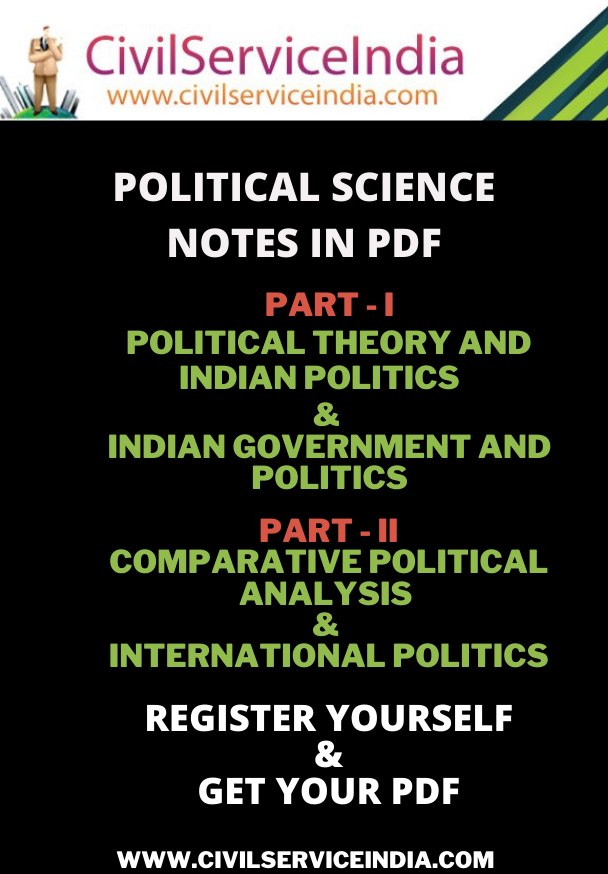Free Political Science
Here are some help tools for tackling Political Science in the UPSC exams, ranging from the syllabus to reading list and other tips. These resources on Political Science also includes IAS Question Papers of Political Science. We wish you to adopt the best strategy and become successful. Suggested Strategy for Political Science. We try our best to provide as many resources for your prepration as possible, but if you can add to this list please feel free to send us links or matter.
 With the help of Ms. Ragini Sinha we are developing some notes for you to do your initial studies from. But do remember that this is not enough and you will need further in depth studies of the subject matter from various sources to able to form fluid answers. We hope you like these notes. We wish all Political Science students all the best.
With the help of Ms. Ragini Sinha we are developing some notes for you to do your initial studies from. But do remember that this is not enough and you will need further in depth studies of the subject matter from various sources to able to form fluid answers. We hope you like these notes. We wish all Political Science students all the best.
Part - I
Political Theory and Indian Politics
- Political theory: meaning and approaches
- Concept of Power Hegemony Ideology and Legitimacy
- Theories of the state: Liberal
- Theories of the state: Neoliberal
- Theories of the state: Marxist
- Theories of the state: Pluralist
- Theories of the state: Post-colonial
- Theories of the state: feminist
- Justice: Conceptions of justice with special reference to Rawl's theory of justice and its communitarian critiques
- Equality: Social, political and economic; relationship between equality and freedom; Affirmative action
- Rights: Meaning and theories; different kinds of rights; concept of Human Rights
- Democracy:Classical and Contemporary Theories
- Political Ideologies: Liberalism
- Political Ideologies: Socialism
- Political Ideologies: Fascism
- Political Ideologies: Gandhism
- Political Ideologies: Feminism
- Indian Political Thought: Dharamshastra
- Indian Political Thought: Arthashastra
- Indian Political Thought: Buddhist traditions
- Indian Political Thought: Sir Syed Ahmed Khan
- Indian Political Thought: Sri Aurobindo
- Indian Political Thought: M.K. Gandhi
- Indian Political Thought: B.R. Ambedkar
- Indian Political Thought: M.N. Roy
- Western Political Thought: Plato
- Western Political Thought: Aristotle
- Western Political Thought: Machiavelli
- Western Political Thought: Hobbes
- Western Political Thought: John Locke
- Western Political Thought: John,S. Mill
- Western Political Thought: Karl Marx
- Western Political Thought: Antonio Gramsci
- Western Political Thought: Hannah Arendt
Indian Government and politics
- Salient Features of the Indian Constitution: The Preamble, Fundamental Rights and Duties, Directive Principles; Parliamentary System and Amendment Procedures; Judicial Review and Basic Structure doctrine.
- Grassroots Democracy: Panchayati Raj and Municipal Government, significance of 73rd and 74th Amendments; Grassroot movements
- Statutory Institutions/Commissions: Election Commission
- Statutory Institutions/Commissions: Comptroller and Auditor General
- Statutory Institutions/Commissions: Finance Commission
- Statutory Institutions/Commissions: Union Public Service Commission
- Statutory Institutions/Commissions: National Commission for Scheduled Castes
- Statutory Institutions/Commissions: National Commission for scheduled Tribes
- Statutory Institutions/Commissions: National Commission for Women
- Statutory Institutions/Commissions: National Human Rights Commission
- Statutory Institutions/Commissions: National Commission for Minorities
- Statutory Institutions/Commissions: National Backward Classes Commission
- Caste, Religion and Ethnicity in Indian Politics.
- Social Movements: Civil liberties and human rights movements
- Social Movements: Environmental movement
- Social Movements: women's movements
- Planning and Economic Development:Green Revolution

